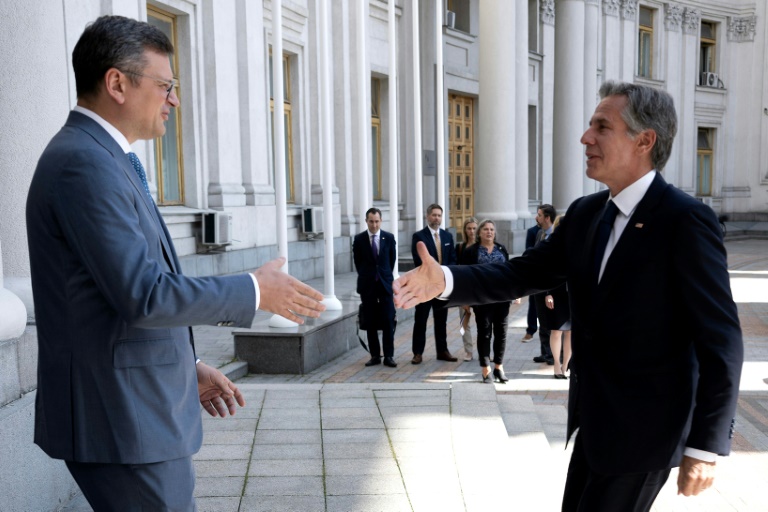Blinken set to unveil $1bn aid package on Kyiv visit

Kuleba greeted US Blinken on his arrival in Kyiv
Kyiv – US Secretary of State Antony Blinken arrived in Kyiv Wednesday after another night of Russian strikes on Ukraine, with Washington set to unveil more than $1 billion in fresh aid to battle Russia.
The visit — his fourth since the start of Moscow’s invasion — comes as Kyiv has touted some successes this week in its counteroffensive to push back Russian forces.
As the top US official arrived, Kyiv’s army said it was pressing on with “offensive operations” towards eastern Ukraine’s war-battered town of Bakhmut — which fell to Russian forces in May — and the southern Moscow-occupied city of Melitopol.
It said troops had been “successful” near the southern villages of Robotyne and Novoprokopivka.
Ukrainian forces have also claimed strategic victories on the southern front, saying they paved the way to push deeper towards Moscow-annexed Crimea.
A US State Department official told reporters en route to Kyiv that they would announce “more than a billion dollars in new US funding for Ukraine”.
Hours before Blinken’s arrival, Kyiv was targeted by a Russian missile strike, which authorities said caused no casualties but did start a fire outside the capital.
The visit also comes as a time for change for Kyiv’s military establishment, days after President Volodymyr Zelenky dismissed defence minister Oleksiy Reznikov — who served throughout the Russian invasion — after allegations of graft in defence ministry contracts.
Parliament on Wednesday approved Zelensky’s nomination to replace Reznikov with Rustem Umerov — a behind-the-scenes deal-maker from the Crimean Tatar community with extensive contacts in Turkey and the Middle East.
The US official said it was a “good time” for Blinken to come, several months into Kyiv’s counter-offensive, and before a second winter during the full-scale war, with energy security fears rising again.
Talks will focus on “what they need for this phase of the battle”, said the official, adding that supplying more air defence would be a “high priority”.
The US has supplied key weaponry to Ukraine that has allowed it to go on the advance this summer.
Progress in Kyiv’s counter-offensive has been slower than expected however, due to heavily mined territory and tough Russian defence lines.
The Kremlin dismissed Blinken’s Kyiv visit, a spokesman saying US aid would not “influence the course of the special military operation” — Moscow’s term for its offensive.
He accused Washington of wanting to “keep Ukraine in a state of war, to wage this war till the last Ukrainian”.
– Danish PM visits –
A string of Western leaders have visited Kyiv during the war, pledging support against Russian forces.
Denmark’s Prime Minister Mette Frederiksen was also in the Ukrainian capital Wednesday, after pledging to supply Ukraine with 19 F-16 fighter jets.
Denmark and the Netherlands last month announced they would provide the advanced jets to strengthen Kyiv’s Soviet-era air force.
Frederiksen addressed Ukraine’s parliament Wednesday, where lawmakers thanked her for supplying the planes.
The US said Blinken and Frederiksen met on their way to Ukraine, which Western leaders have mostly been reaching by train from Poland.
State Department spokesman Matthew Millar said Blinken thanked her for “Denmark’s leadership in the F-16 coalition of partner nations to train Ukrainian pilots, and for its decision to donate F-16 jets to Ukraine.”
Russia has called the decision to supply Ukraine with the American planes an “escalation.”
– Russian drone strikes –
Overnight, Russian drone attacks on the country’s south-western corner near Romania killed one person.
Moscow has pounded Ukraine’s Black Sea and Danube ports for weeks after exiting a key deal that ensured the safe navigation of ships carrying grain.
“Unfortunately, one person died,” said Kiper, adding that it was an agricultural worker who was seriously injured and died in hospital.
“Destruction and fires were recorded in several settlements,” he added, with port and agricultural infrastructure including administrative buildings damaged.
The Danube river port of Izmail, which borders NATO member Romania, has become a main export route for Ukrainian products following Russia’s withdrawal from a UN-brokered grain deal in July.
Following the collapse of the agreement that had allowed grain shipments from Black Sea ports, Russia has ramped up attacks on Ukraine’s southern Odesa and Mykolaiv regions, home to ports and infrastructure vital for agriculture exports.
The president of NATO member Romania, Klaus Iohannis, said Tuesday that the attacks had taken place “very, very close” to his country’s border.
